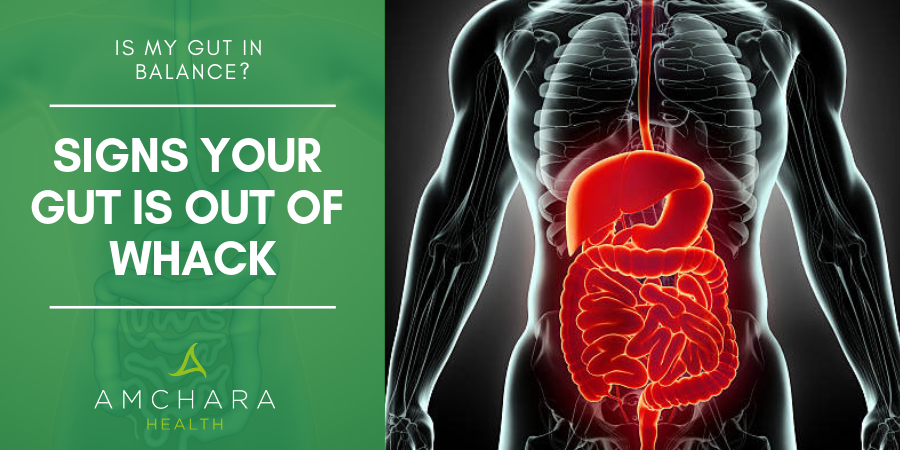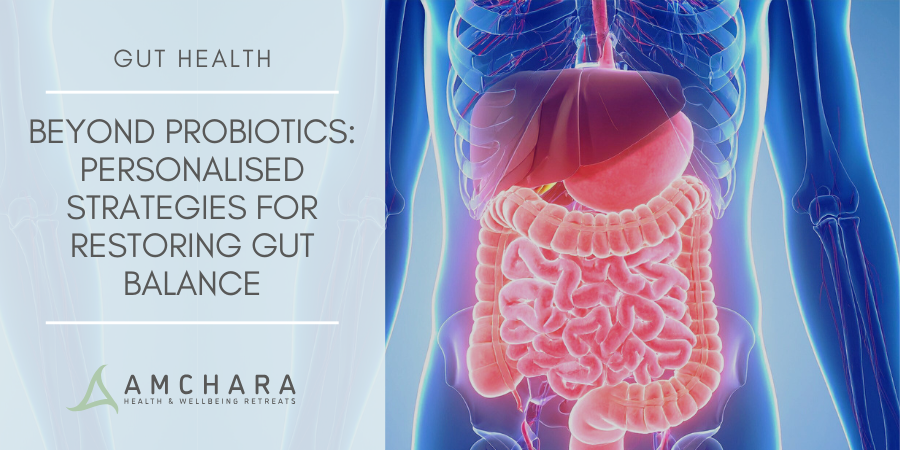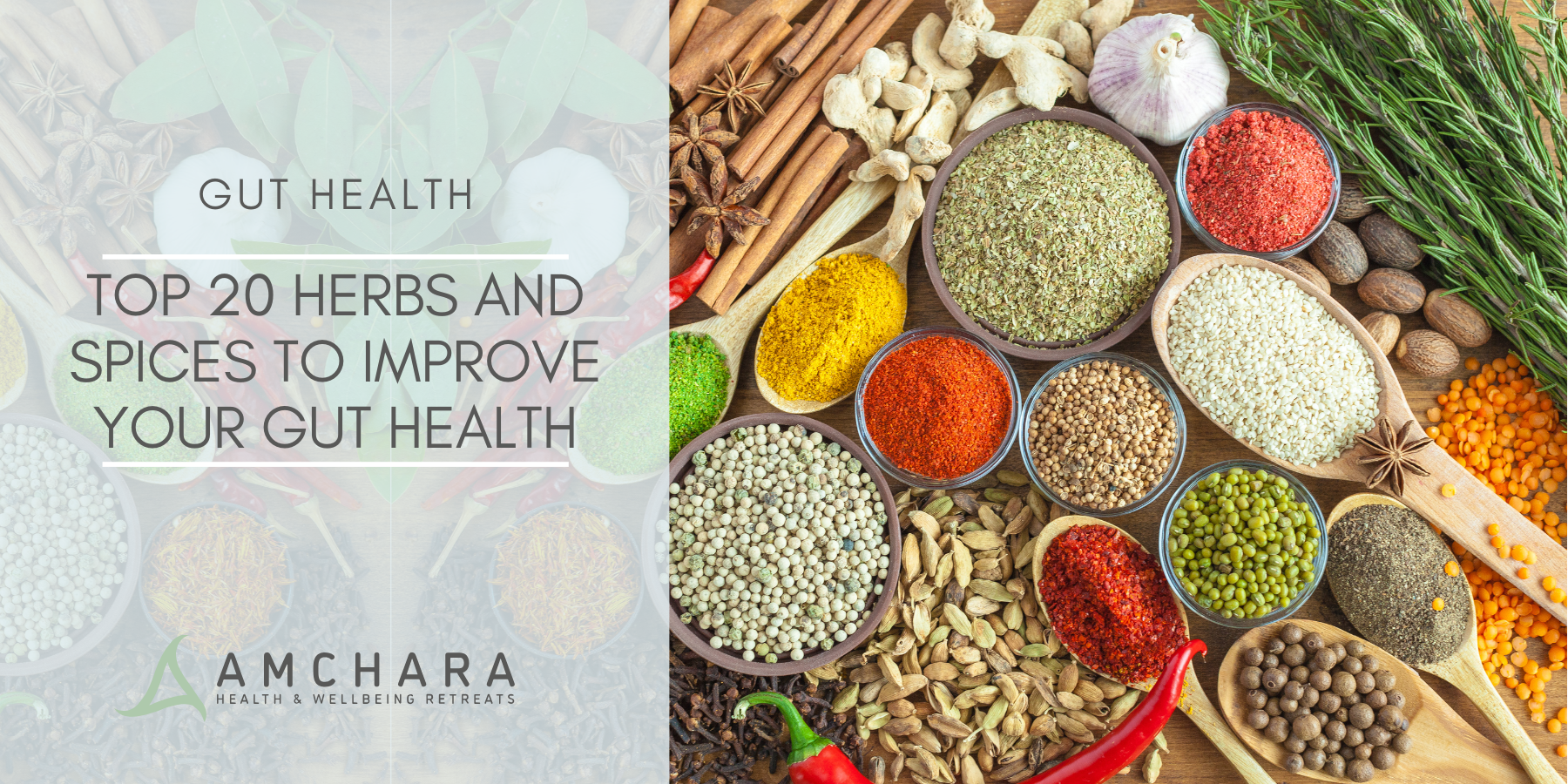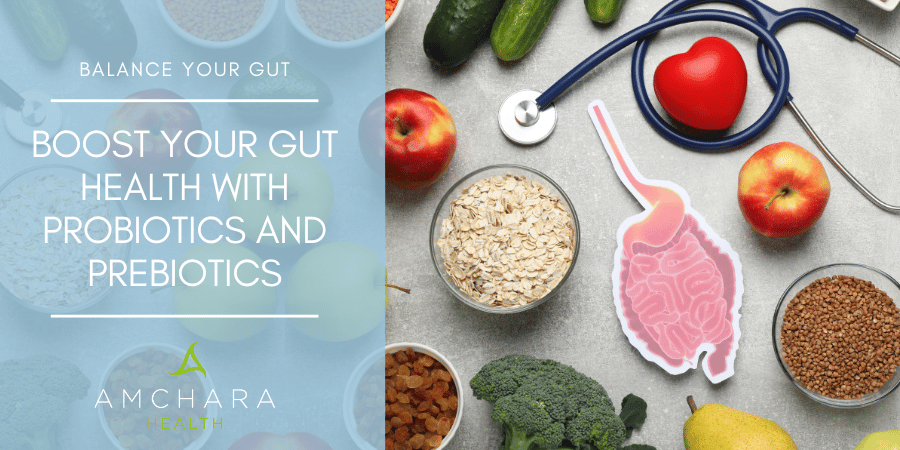Table of Contents:
- Symptoms of an Unhappy Digestive System
- Our Body’s Waste Disposal Unit
- The Microbiome and our Health
- Our Gut is Our Second Brain
- What Can Cause Gut Imbalance?
- The Amchara Guide To Achieving Optimal Gut Function
Have you ever suffered from any of these troublesome digestive symptoms?
- Irritable bowel syndrome
- Bloating or gas
- Constipation
- Diarrhoea
- Heartburn or acid reflux
- Indigestion
If the answer is yes, you’re not alone – according to one study, as many as 86% of the UK adult population had suffered from some form of gastrointestinal problem in the previous year (1). More women are affected than men.
A well-functioning digestive system is crucial to good overall health.
This is because all our body processes are in some way linked to our gut.
The health of our digestive system determines not only how well nutrients are absorbed, but also how effectively toxins, microbes and allergens are kept out of the body.
Symptoms of an Unhappy Digestive System
Many people don’t realize the extent to which problems with our gut impact our overall health.
Digestive issues can be linked to a huge array of seemingly unrelated health conditions including allergies, skin rashes, acne, eczema, psoriasis, arthritis, autoimmune disease, headaches and migraine, chronic fatigue, mood disorders, brain fog, autism and dementia.
Our digestive system performs three major roles: digestion, absorption and elimination.
In essence, it turns food into energy, extracts nutrients and packages the residue for disposal.
All three need to be functioning optimally otherwise our overall health will suffer.
Digestion
The main function most people will think of when we talk about our digestive system is its role of breaking down our food in order to extract the bits we need.
Our digestive system is made up of our mouth, oesophagus, stomach and small and large intestine.
Food passing through our digestive tract doesn’t technically enter the body unless it’s absorbed through the gut wall into the bloodstream.
Absorption
We often hear the phrase ‘we are what we eat’.
In actual fact, it’s more accurate to say we are what we absorb.
The digestive system has the important role of ensuring the nutrients in our food are absorbed into the bloodstream so they can reach where they’re needed.
It’s vital the cells lining the digestive system are as healthy as possible because the gut lining determines what is allowed access to your body and what is not.
If inflammation affects the gut lining it can become damaged and less selective than it should be.
The result is a ‘leaky gut’ which allows substances to be absorbed into the bloodstream that really should be eliminated to the outside world with our faeces.
If our gut is too leaky, substances which aren’t completely digested can be absorbed into the bloodstream.
Because they’re unfamiliar to our immune system, the body reacts to these substances and food intolerances can occur.
This incomplete digestion is particularly prone to happen with large, complex protein molecules such as gluten, often when they form a large part of what we eat.
Elimination – Our Body’s Waste Disposal Unit
Finally, those parts of our food which aren’t needed by the body or can’t be digested need to be eliminated.
Another major role played by the digestive system is to expel these food particles, as well as toxins which are produced in our body during normal metabolism.
Our liver plays a big part in this process when it transforms toxins into substances which can then be shunted into the colon to be safely escorted to the outside world.
The colon is a muscular tube, six feet in length which connects the small intestine to the rectum.
If the gut contents travel along too slowly, toxins can be reabsorbed back into the bloodstream where they end up travelling to the liver once more to be processed again.
This way we’re adding to our toxic load and giving our liver more work to do.
It’s a bit like tipping the contents of your kitchen bin right back in the middle of the floor, just after you’ve cleaned it.
If this carries on, toxicity within the body can build up and impact on our health.
The Microbiome and Our Health
We play host to a huge number of different species of bacteria in our intestines.
Together, they’re called the gut flora or microbiome.
The function of these bacteria is to regulate and facilitate digestion, production of certain vitamins and other substances necessary for health, and hormone regulation.
The exact makeup of the population of bacteria in your microbiome is unique to you.
We’re gifted the basis for our microbiome by our mother during birth.
However, the shape it’s in by the time we reach adulthood is determined by a number of factors including the food we eat, the medical drugs we take and our stress levels.
Different species of bacteria can be broadly classified into beneficial and non-beneficial.
The friendly ones produce substances which are helpful to digestion and keep the intestinal lining healthy.
Health conditions can occur when certain strains of bacteria over-reproduce.
The neat thing about the bacteria in our microbiome is they produce for themselves a perfect environment.
Friendly bacteria usually keep the unfriendly ones from thriving by producing compounds which are toxic to them.
However, if the environment inside our gut becomes hostile to our beneficial bacteria, the unfriendly bacteria take over and a condition known as dysbiosis occurs. These non-beneficial types of bacteria can produce gas, interfere with digestion and produce unwanted toxins.
They then go to work producing the type of environment they themselves prefer, which means our friendly bacteria have a hard time thriving once more.
Dysbiosis can cause all sorts of problems like inefficient digestion and absorption of nutrients, damage to the digestive lining and even hormone imbalance.
All this results in symptoms like bad breath, nausea, constipation, diarrhoea, bloating, fatigue, depression and vaginal or rectal itching.
Another way in which gut health enormously influences our overall health is the fact it houses a layer of cells called the GALT, which is an incredibly important part of our immune system.
GALT stands for gut-associated lymphoid tissue, and it makes up around 70% of your immune system.
Remember the contents of the digestive tract are actually outside our body?
This means there can potentially be all sorts of pathogens in there, so the GALT protects your body from this toxic external environment.
From this, you can see it’s vital the GALT doesn’t become compromised.
If it does, the result is often inflammation of the intestinal lining, which can allow harmful molecules access to the bloodstream.
Our Gut is Our Second Brain
Have you ever felt butterflies in your stomach before a job interview or a date?
Do stressful situations affect your digestive system?
We all know this happens, and scientists have found neurotransmitters – the chemical messenger’s brain cells depend on to communicate with one another – identical to those found in the brain are also found in the digestive system.
In fact, they are synthesized in our gut (2), meaning our gut directly affects our mood.
A complex network of millions of neurons line your stomach and your gut and keep in close contact with our brain.
This is our second brain or enteric nervous system.
Those butterflies are the brain in your stomach communicating with the brain in your head.
It’s a two-way process – emotions and stress can affect the functioning of the digestive system, while gut health can affect our emotions.
Research has found irritation in the gut may send signals to the central nervous system which trigger mood changes such as depression.
In fact, we know a high percentage of people suffering from IBS also suffer from depression and anxiety.
Scientists now believe poor gastrointestinal function can also be connected with autism and ADHD.
What Can Cause Gut Imbalance?
- Our dietary choices. Foods containing high amounts of sugar will feed the undesirable bacteria.
Our friendly bacteria feed on fibre, so too many processed foods which are depleted in fibre and nutrients can not only encourage dysbiosis but also contribute to a sluggish digestive system. This creates an environment where our beneficial bacteria can’t thrive.
Intestinal contents which move too slowly can also lead to inflammation of the intestinal walls.
- As we’ve seen, stress can have a massive effect on the digestive system due to the close relationship between our emotions and our gut.
Stress can lead to inflammation and leaky gut. Stress can also directly affect the balance of bacteria in our microbiome.
- Certain medical drugs can interfere with or damage the normal functioning of the digestive system.
It’s not only antibiotics which can wipe out our beneficial bacteria in our colon.
One study (3) looked at over 1000 drugs for all kinds of ailments and found almost a quarter of these killed off some of the bacteria in our gut. In the vacuum that’s created, opportunistic pathogenic bacteria, parasites and yeasts – the bad guys – can take over.
Other drugs such as anti-inflammatories and steroids can also damage the gut lining, while antacids reduce gastric acid secretion in the stomach. This can lead to poor mineral absorption.
- Although we need our friendly bacteria, they should be concentrated in the large intestine.
When they colonize the small intestine where they’re not usually found, the result is small intestinal bacterial overgrowth or SIBO.
The bacteria then feed on sugar and carbs.
Symptoms of SIBO include burping or bloating immediately after eating, abdominal pain and cramping or diarrhea.
- We are all exposed to a huge array of environmental toxins from our water, food, chemicals used in the home and on our skin, and even floating in the air we breathe.
Some of these toxins may adversely affect our digestive function.
We now know chemicals such as weed killers containing chemicals called glyphosates can destroy friendly bacteria.
Artificial emulsifiers are added to foods to mix oil and liquid together and are known to produce inflammation in the digestive system (4).
- By optimizing digestive function by healing the gut lining and paying attention to our bacterial load, many of the troublesome symptoms mentioned earlier can be avoided.
The Amchara Guide to Achieving Optimal Gut Function
- Eat unprocessed, whole foods including vegetables, beans, seeds, nuts and wholegrains which are high in fibre and naturally low in sugar.
Our bacterial balance is adversely affected by sugar in any form. In fact, the undesirable bacteria love it so much they send a message to our brain to make us want to eat it! Sugar is not only found in cakes, biscuits, confectionary, alcohol, soft drinks and desserts, but also in the majority of processed foods.
- If you suspect you have food sensitivities, try eliminating gluten, dairy, yeast, corn, soya products and eggs for a week or two and see how you feel. You can re-introduce them one by one and note how your body reacts.
- It may help to take digestive enzymes with your food. Enzymes are naturally produced by your body when you eat, but this process can be hindered by nutrient deficiencies such as a lack of zinc.
Deficient digestive enzyme production typically causes symptoms of bloating, gas and undigested food in stools. Taking replacement enzymes with a meal may help to improve how your body breaks down your food.
- Watch portion sizes. It’s easy to overeat because it takes around 20 minutes for your brain to hear the message sent by your stomach that it’s full. Eating smaller meals can help you digest your food more easily. It will also mean your energy remains topped up throughout the day.
- Eat more slowly. If we eat too quickly, food will reach the stomach too soon and the secretion of stomach acid won’t be able to keep pace. Digestion starts in the mouth, so we need to chew our food thoroughly which means it is combined with saliva.
This contains the enzyme amylase which starts carbohydrate digestion. If digestion is not started efficiently in the mouth and stomach, it won’t be digested as well once it reaches the small intestine. It’s also important to relax when eating – as we know, a stressed digestive system doesn’t work effectively!
- A supplement of omega-3 fatty acids such as those contained in fish oil can help to reduce inflammation throughout the body including the gut.
- Certain nutrients play a key role in the health of the digestive lining. These include the amino acid glutamine and vitamin D. Zinc is important for immune health and the proper functioning of the GALT.
- Take a probiotic supplement to boost the numbers of healthy bacteria in your gut. Look for a product with a broad range of strains and high volumes of bacteria per capsule.
- By looking at the bacteria and the byproducts they produce in your faeces, it’s possible to determine the state of your microbiome within the colon and small intestine.
A stool test can look for infectious and pathogenic bacteria, overgrowths of parasites or yeasts, as well as measuring intestinal inflammation and determining the health of your gut lining.
Armed with this information and with the guidance of a qualified practitioner, dietary modifications and specially-selected supplements can help restore the correct environment and bacterial balance in your gut.
Conclusion
The takeaway message here is in order to look after your health, it’s crucial to be kind to your gut.
Keeping your friendly bacteria in balance, avoiding constipation and maintaining a healthy intestinal lining are all important to keep your digestive system healthy.
If you are suffering from problems with your gut, Book a Free Gut Health Consultation Today
We’re dedicated to providing you with both insightful information and evidence-based content.
We always take an evidence-based approach and aim to provide you with actionable knowledge and tips to help you on your journey to optimal health.
Remember the advice given may not be suitable for every individual.
Have you suffered from digestive disorders?
Do you have any top tips to help heal your gut?
We’d love to hear your thoughts, get in touch!
Book Your Free Gut Health Consultation Today
By Cathy Robinson BScDipNutMed
READ NEXT:






